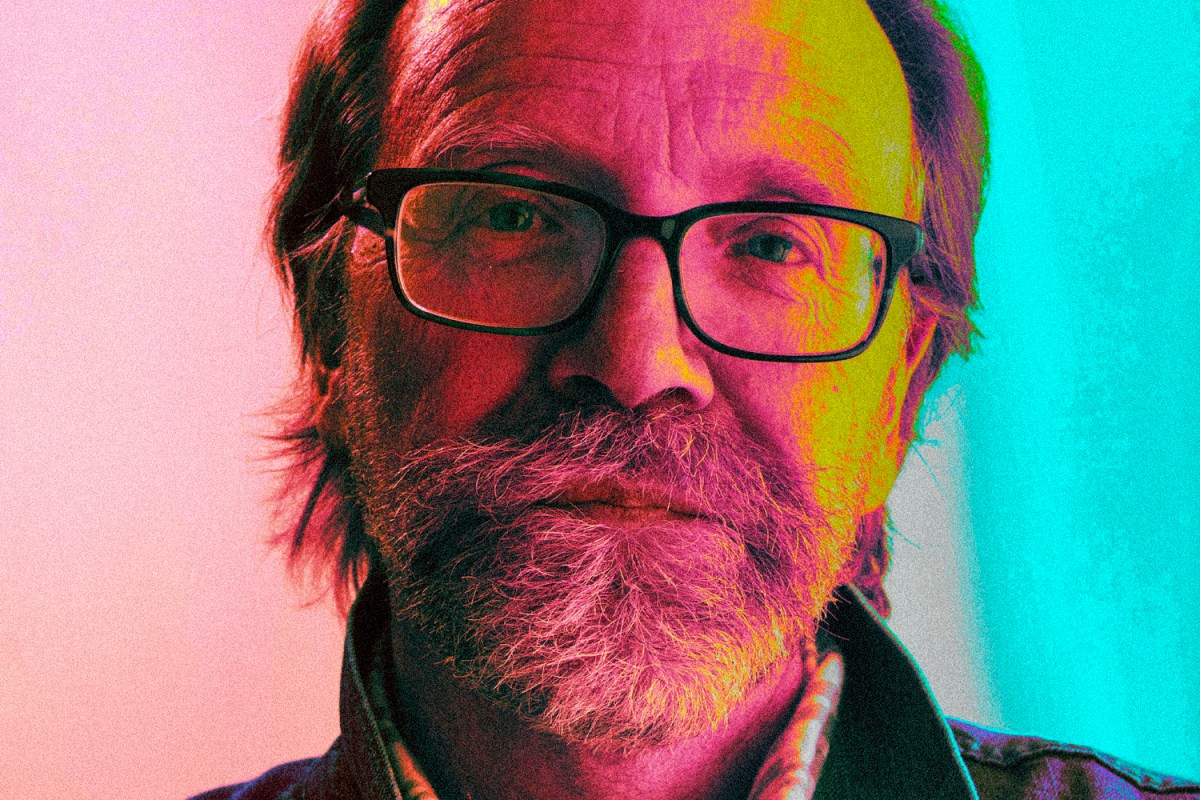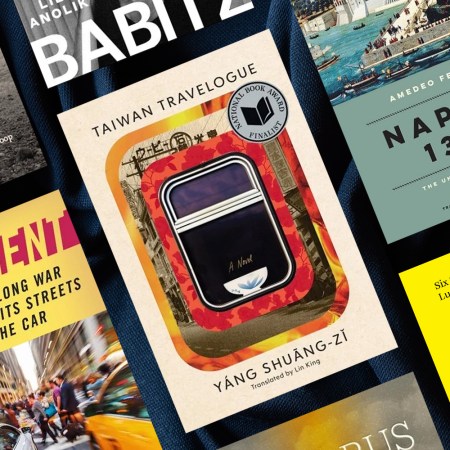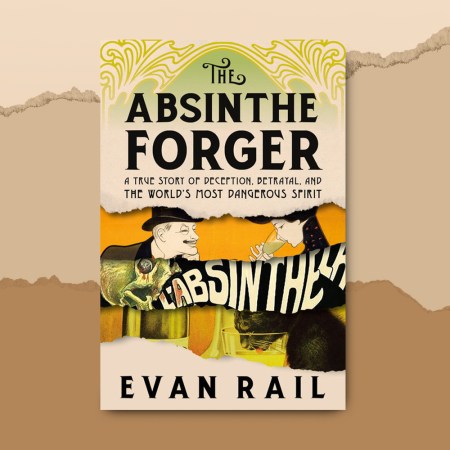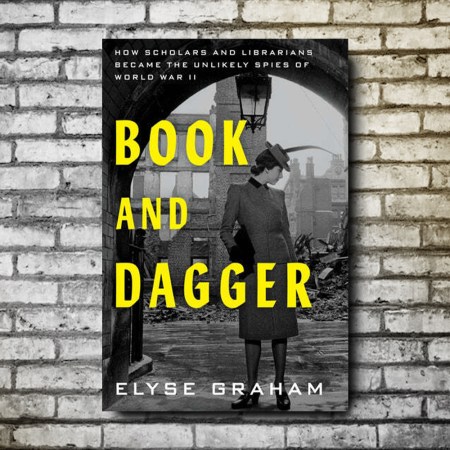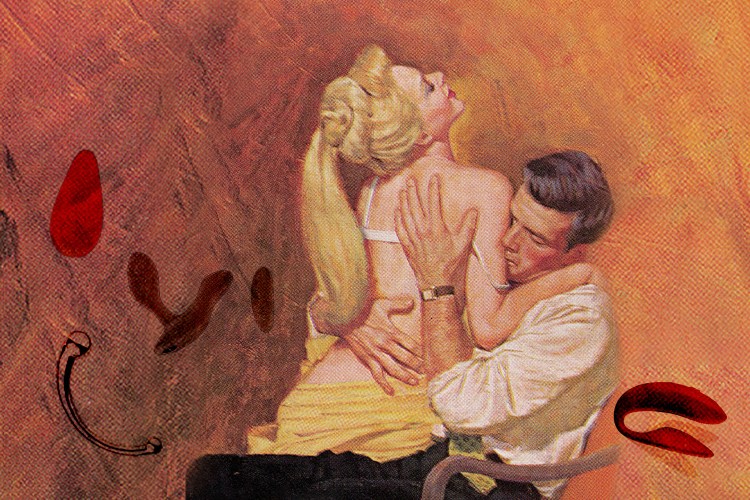If you’re a reader of contemporary American fiction, you’re almost certainly familiar with George Saunders. His strange, hilarious and moving stories are among the most celebrated and imitated around, and he’s won a bevy of awards to prove it, including a MacArthur Genius Grant and the Man Booker for his novel Lincoln in the Bardo. Saunders’s specialty is satirizing the absurdity of modern American life, which makes his work feel especially prescient today.
His new book, though, looks at a different era: 19th-century Russia. In A Swim in a Pond in the Rain, Saunders draws on his decades of teaching and the stories of Chekhov, Turgenev, Tolstoy and Gogol to give a — as the book’s subtitle says — “Master Class on Writing, Reading, and Life.” It’s an expert and inspiring look at how stories are made and how they can move us.
Recently, we chatted with Saunders over email about his writing process, teaching methods and the power of fiction to heal and connect people at a time when those qualities are in increasingly high demand. You can find that conversation in its entirety below.
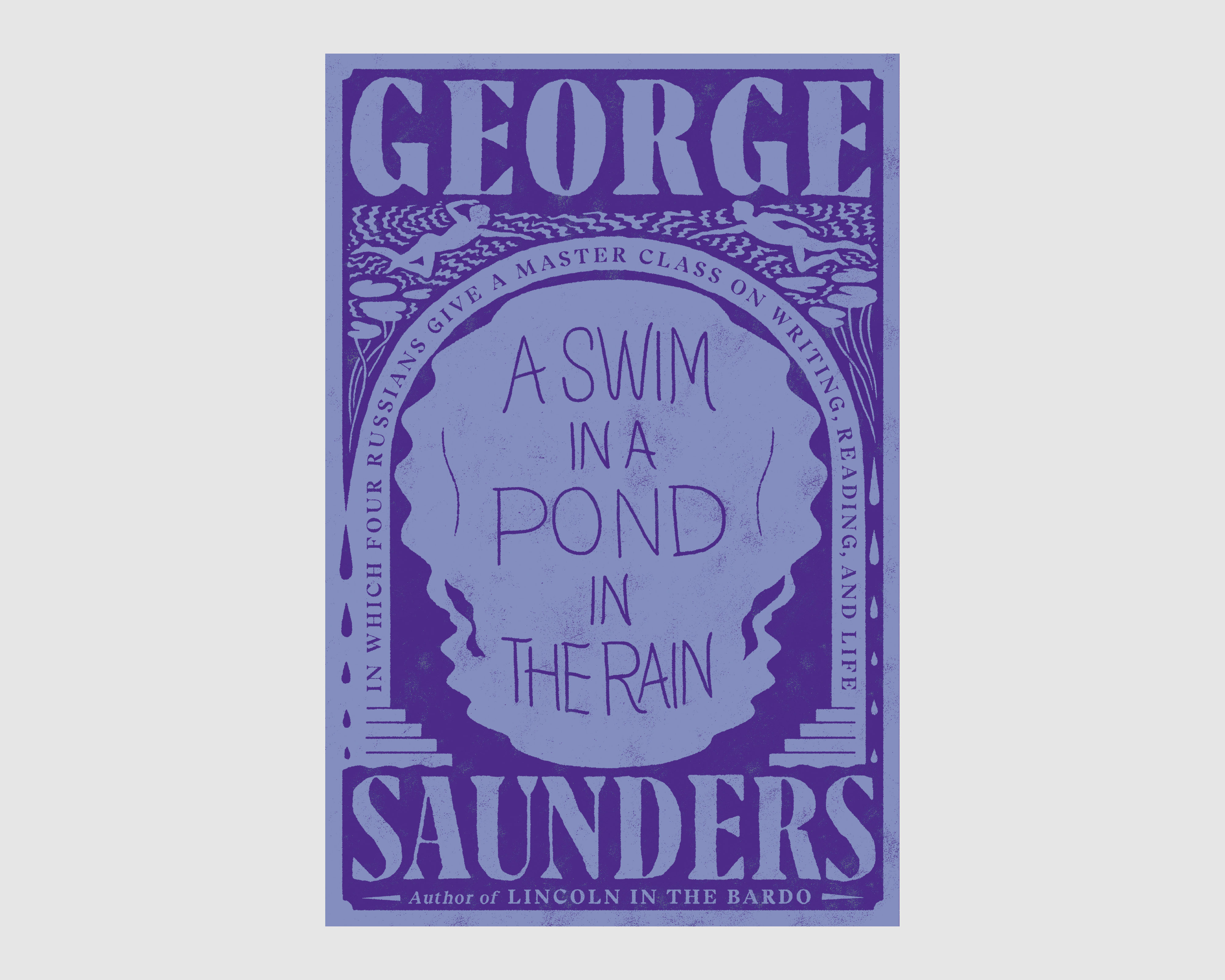
InsideHook: Maybe I could start by asking why you chose to write about these 19th-century Russian authors in 2020?
George Saunders: I think I really had it in mind to write about teaching — to put down some of what I’d learned about teaching, and about the different ways of talking about writing, and the benefits of same. But I really liked the idea of doing it from an angle, by using these Russian stories as a focal point. I am wary of a “how to write” approach because I know, from all these years of teaching, that there is not just one approach. So the hope was to tease out some underlying principles of fiction that would help a writer no matter who she or he was.
You describe the four authors here — Chekhov, Turgenev, Tolstoy and Gogol — as “resistance literature,” written in a time of censorship and repressive culture and positing “the most radical idea of all: that every human being is worthy of attention and that the origins of every good and evil capability of the universe may be found by observing a single, even very humble, person and the turns of his or her mind.” Is resistance an essential function of literature? And what does resistance literature look like today in America?
Yes, but I think what literature helps us resist is our own habituation. The mind likes to settle into “knowing,” to go on autopilot, which is sort of the opposite of actually being alive. To be alive, or to be, you know, optimally alive, would mean being fresh and open to every moment and every person — not permanently decided about anything. I think literature puts us (artificially and briefly) into that state for a few precious minutes and thus reminds us that that state exists and is attainable.
For us, today, in America, I think we need to come into some realization about the way that corporate capitalism has learned to look very hip and charming and essential and is still fundamentally against the individual. Or, it sees the individual as a datum to be exploited. It has learned to do this in a way that aligns with what feels like the individual’s interests, and yet I think so many of us are sad because we can feel the actual misalignment. This issue can be taken on directly, in the subject of the story, or it can be taken on just by writing a really good story about anything. The act of two people (reader and writer) huddled over a story is a show of confidence in our ability to parse out incredible nuance and our ability to really be open to the Other. That’s the whole game: we start out regarding the character as we would someone passing on the street (“Huh, that dude looks goofy”) and then, by the end of the story, if it’s a good one, he’s become, essentially, “us, on a different day” or “us, located in a different life.” That move right there is pretty radical. It says that our first impressions are actually badly informed projections, based on very little, and it says that we are capable of honing those impressions into something more like love, or fondness — we know so much about the character that we feel comfortable really looking at him or her. The story form, we might say, gives us time to do that (in a way that real life doesn’t — before we know it, that sad-looking guy is getting on the bus and, for us, he’s all done).
In several of these chapters, you suggest that what makes the stories so brilliant might not be at all what the author intended. Is that an inevitable part of writing? Creating meaning without intending it?
Yes — I’d say we are trying to blunder into a meaning that is bigger and more destabilizing than the one we set out to proclaim. We’re hoping to blurt out some truth that even we didn’t know we knew, until we blurted it out. And that doesn’t have to be (usually isn’t) just a statement or some epigrammatic item of belief that we have a character state, but an arrangement of things on the page — the way a character responds to a situation, a juxtaposition occurring in the structural life of the piece, that “says” something surprising. A story has a million ways of conveying meaning, and, therefore, of surprising its writer. But, to me, that’s the whole game. Start out thinking your story is going to be A, and then keep hoping it jumps the rails and becomes some new and unexpected thing. And, as I say in the book, the way to do this, is to do what pleases you — that is: get in better touch with your micro-opinions and delights and just follow them up the trail to see where they lead. We’re basically trying to get free of that part of the mind that feels it has to be in control and know everything and impress the reader by inflicting all of our wisdom and wit on the reader, regardless of how he or she feels about it.
But, regarding intention — I also say in the book that the act of sending a story out into the world is, actually, an act of intention. You “approve that message.” You may not know everything your story is doing, and the things it is doing might not have been part of the initial plan, but by reading it that last time and giving it your blessing — you, therefore, “intend” it.
A lot of craft advice, especially in the MFA world, is very writer focused without much discussion of the reader. (Sometimes the advice is to ignore the idea of a reader entirely.) I loved how A Swim in a Pond in the Rain takes a very reader-focused approach. Less “write what you know” than “what does the reader know on page one? And on page two? And page three?” How does thinking about the reader’s experience — from line to line, page to page — guide your writing process?
Honestly, that is my whole writing process but with one caveat — that reader I am imagining is me, if I hadn’t already read the story a million times. So I am writing to myself, which, in a weird way, means I am showing my reader respect. I feel like I’m an alert, smart, generous (but not too generous) reader, who’s been all around the world and read a lot and is no sucker and is genuinely curious about life — so, if I’m writing to that guy, that’s another way of saying that I am imagining my reader to be as alert and smart and etc. as I am. So the mantra becomes: no condescension. Which is another way of saying: be in constant, respectful communication with the person on the other end of the text.
That’s how I see it anyway. One of the things I say in the book is that writing advice is all conditional and exploratory. As a teacher, I say, “Hey, try thinking about it this way — it might help.” If it does help, that’s great. If not, we just discard that metaphor and find another, better one (better for you). There is no “right way.” There is just the way that works for the individual writer. And actually, there’s just the way that worked for her today. Tomorrow is another thing altogether.
In your introduction, you say that when teaching creative writing you “sometimes joke (and yet not) that we’re reading to see what we can steal.” What things have you stolen (or perhaps we can say borrowed) from the Russians for your own fiction?
One thing is the notion that the writer and the character are not the same person. We can make a character by giving him some of our beliefs — but then we can step outside of that process and make the fictive world respond to him. To me, this is the essence of what, say, Shakespeare does. And this is a way of saying that every human emotion and reaction and stance is contained, to some degree, in every person — a radical notion. If I am feeling a certain thing, you have felt some version of that. So “creating a character” might just be “grabbing a tendency out of myself and then putting some clothes and a hat on it and calling it ‘Gary’” — and then seeing what the fictive world makes of Gary.
In the chapter on Gogol’s “The Nose” you discuss the Russian “skaz” form, a kind of intentionally — yet artfully — graceless, bumbling voice. You often create beautiful stories out of narrators with limited, commodified and/or awkward styles of speech. Can you talk about this “skaz” voice and perhaps the importance of voice in general in your work?
Sure. I had a breakthrough when I realized that the way I naturally thought could be exploited. Or, we might say, that any voice we can naturally make can be the starting point for a fictional voice. My natural way of speech is inexact and rambling and working-class. Like, if we were recording this interview, the transcript would be … all over the place. Ungrammatical, rambling, etc. So, of course, my early writing years were all about trying to curb that tendency and attain some erudite, highly articulate voice. And that was good — I became a more precise writer. But the breakthrough came when I started “doing” my natural, sloppy voice and then revising that (into a more elevated and precise form of slop, I guess).
The point I make in the Gogol essay is that there is no perfect, objective voice or mind — we are all flawed. So there’s a certain way in which a story told in a flawed voice can be more truthful — the wonkiness of the observing party is factored right in, we might say. A number of my stories have very corporate narrators who do things that a character with a more precise way of thinking and talking would know better than to do. So, to think or speak in a certain diction confines or morphs one’s philosophy, we might say. If I write, in a memo, “Our goal is always finding the optimal relation between customer health and the required financial motivators” — well, I can then, within that system of logic (which was made via language) find a way to deny you your medicine. But if I’d said, “We have this medicine but we can’t let you have it unless it’s profitable for us” — that might have the effect of, you know, limiting my options. So, we make the world with language and any language is sacred, in a sense — it’s saying something, and whatever that something is, it’s speaking to the incredible range of human experience.
You’ve said before that it’s “a mistake to think that a story is a result of ideas.” If stories don’t come out of ideas, what do they come from?
They might start from an idea but then something else takes over, and I guess I’d say it’s … truth? Once you start telling a story, it has a natural energy — it has something it wants to do. You may not know what that is but your job is to find out — by letting the story respond to itself.
Let’s say you have the idea: “If people would just be kind to one another, the world would be good.” (An idea with which I agree, by the way.) OK. Enter Louise, a very kind person. She goes to work. Her boss treats her like shit. What does she do? Well, she’s kind to him. And again he treats her like shit. Why did we (the writer) have the boss do that? He could have just … reformed. Well, we did that because some truth-respecting part of us was like, “There exist, in this world, people who, even when treated kindly, are jerks. And my story will be false if I don’t somehow build that fact into it.” Now what? Because it’s a story, and we expect change, it’s not going to work to repeat beats (Louise, again, responds by “being kind,” in the same way she did before, after which her boss is again a shit.) So — just like that, the story has come to be about the question, “Well, what is kindness, anyway?” (How “kind” is it for Louise to allow herself to be treated like shit and to just keep doing the same thing in response? Is she being “kind” or is she being “docile and unengaged?” And so on.)
Another way of saying this: if we have an idea and the story just proves that idea, the reader feels that — the fix was in. She feels excluded and (merely) acted upon, instead of feeling like a full participant — which she will feel, if the writer is honest as he goes about fire-testing his initial idea.
You have a really interesting definition of revision as “a chance for the writer’s intuition to assert itself over and over again.” Basically, by revising over and over we are letting our artistic intuition assert itself over and over. Can you talk about the importance of revision and also how to decide when the intuition has asserted itself enough and the piece is finished?
Yes, that’s the million-dollar question and it’s one that any real writer knows is the essence of the thing. I guess I’d just say that knowing when enough is enough is one of the skills that each writer develops for herself, and she does that by both not going far enough (many times) and going too far (many times). It’s like so many things in life — relationships, say. You date a certain kind of person because you like a certain trait he has. But turns out, he has too much of it. So you find someone with less of that trait — but he’s got this other, annoying, trait. And so on and so on and one day you wake up and you sort of know what you want. (Or, I guess it’s like Goldilocks and the Three Bears — we are seeking that “just right” moment, and learning to know what that moment feels like for us.)
And I think it’s important to say that there’s no magic number of revisions that is sufficient. Sometimes I finish a story really quickly and sometimes it takes years. So that’s another “professional skill” a writer develops — the ability to be wary of the “requirements” (“A story is not done until I have done hundreds of drafts”) and just … know it when you see it (i.e., learn to accept a blessing if and when it comes to you).
But my experience is that most of us, when starting out, don’t revise enough, or in the right spirit. Which is … sad. It separates from finding out about all the different kinds of writers within us, and about the particular ways in which our stories might work, that are unique. One of the points I make in the book is that our uniqueness is attained just as much by what we cut as by what we say initially — actually, I’d say even more so. So … the flavor of your editing is who you are as a writer. (Give 10 writers a swath of so-so prose and watch what each does with it. A few of them will be able to make something fast and radical and odd out of it. That, too, is writing.)
Over the years, my writer friends and I have sometimes said, “How is this not a George Saunders story?” when sending each other absurd news articles about dystopian corporations and dysfunctional politics. In 2020, this turned into “we’re all living in a George Saunders story.” If this isn’t too strange of a question, what does it feel like to see your fiction go from satirical and exaggerated to feeling like an almost straightforward depiction of our bizarre reality?
Yes, I read and really enjoyed that piece you wrote, Lincoln.
On one level, it feels good — something from out there was finding a home in my writing. And I think that has to do with this intuitive approach I’ve been describing. (The writer as very responsive windsock — a sort of, uh, silk windsock.) But, on the other hand, I don’t really see that (prediction) as my goal. And to the extent that I predicted, I under-predicted and was slightly off — a windsock hanging a little crookedly on the pole, or a canary in the coal mine who is deaf in one ear and a little drunk.
I am trying to write about human tendencies, eternal ones. So I can see that I picked up on a certain American preference for stupidity (an aversion to “elitism,” that can easily convert into an aversion for “excellence” or “truth” or “compassion”). I think I also picked up on how hard it is for people to live within the corporate-capitalist behemoth while trying to be happy.
But ultimately I think my work will have value to the extent that I am talking about our eternal dilemma, which is: we are spiritual beings, stuck in a material world. Our culture is one way humans have tried to solve the problem and it has produced a bunch of related hardships and nightmares (and delights and blessings). But ultimately, I’d say, literature has value to the extent that it transcends times and places and talks about the fundamental human things: “I’m in this mind and body and I feel like a permanence but I’m not. Holy shit: What should I do?”
We live in an era when many question the relevance of literature and “the novel is dead” articles seem to be published every week. You write that the Russians thought of fiction as “a vital moral-ethical tool” and you’ve spoken before of fiction providing “empathy training wheels.” What importance does (or can) fiction still have in 2020?
I’d say, the same old importance. It reminds us that we’re here, more vitally and with more dimensionality than any other form, in my view. Of course, that’s only true for the very best literature.
But I’d challenge everyone to ask: “Is there any relation between the decline of literature over the last X years, and the increasingly snarky and selfish and polarized tone of our public discourse?” And: “There’s this thing called ‘storytelling’ that every generation has respected as an incredibly efficient and nuanced form of transmitting the most essential information. Who is doing our high-level storytelling now, and what is their underlying motivation?” (That is: How do most of us get our ideas about the world beyond our immediate experience?)
Social media is a nice form of storytelling but it has serious built-in defects (it was designed by corporations, and is infused with corporate aspiration, which, in turn, inflects the storytelling mode we do within it). We tell stories most grandly and widely these days through TV and movies, but there, also, the thing has to be financially viable and not in any modest way, either. These stories, especially the blockbusters, are just rife with lies — lies about physical plausibility (I have never quite been able to leap from a burning building onto a speeding bus while being attacked by metallic cyber-vultures, although, God knows, I keep trying) and lies about how people behave (increasingly these stories are Pure Evil vs. Pure Good and everyone knows that the end of the story is when Pure Good reluctantly kills Pure Evil and, along the way, we’re never in doubt that Pure Good will not die at the end). I mean — all of this is fun, but I find myself wondering why so MANY of our stories seem to be based on these notions. There must be some reason (apart from the finances) that our big stories (the one in which everyone shares) are so simplistic and sort of sadistic.
Lord knows, there are bad books too, and there are incredibly beautiful movies and TV shows — but what’s needed, in all of our forms, I’d argue, is more literature; that is, stories that admit to a full range of human behaviors and are interested in how shit actually happens, and are willing to be confused and ambiguous and give off mixed signals and so on. Anyway, that’s one part of my brain talking (Luddite, purist, etc.). Another part — maybe the better part, feels: Ah, things are how they are and it’s lovely. We don’t want to be the guy, out in the ocean, complaining that there are waves in this damned thing. The waves are the thing, and it’s good to be able to enjoy and celebrate whatever waves we find ourselves in.
This article was featured in the InsideHook newsletter. Sign up now.
